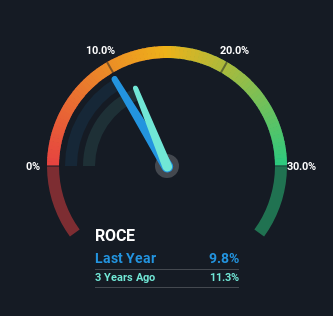- Romania
- /
- Telecom Services and Carriers
- /
- BVB:DIGI
Returns On Capital At Digi Communications (BVB:DIGI) Have Stalled
If you're looking for a multi-bagger, there's a few things to keep an eye out for. Firstly, we'd want to identify a growing return on capital employed (ROCE) and then alongside that, an ever-increasing base of capital employed. Ultimately, this demonstrates that it's a business that is reinvesting profits at increasing rates of return. Although, when we looked at Digi Communications (BVB:DIGI), it didn't seem to tick all of these boxes.
Return On Capital Employed (ROCE): What Is It?
For those who don't know, ROCE is a measure of a company's yearly pre-tax profit (its return), relative to the capital employed in the business. To calculate this metric for Digi Communications, this is the formula:
Return on Capital Employed = Earnings Before Interest and Tax (EBIT) ÷ (Total Assets - Current Liabilities)
0.098 = €196m ÷ (€3.4b - €1.4b) (Based on the trailing twelve months to March 2024).
Thus, Digi Communications has an ROCE of 9.8%. In absolute terms, that's a low return but it's around the Telecom industry average of 11%.
Check out our latest analysis for Digi Communications

In the above chart we have measured Digi Communications' prior ROCE against its prior performance, but the future is arguably more important. If you're interested, you can view the analysts predictions in our free analyst report for Digi Communications .
How Are Returns Trending?
There are better returns on capital out there than what we're seeing at Digi Communications. The company has consistently earned 9.8% for the last five years, and the capital employed within the business has risen 62% in that time. This poor ROCE doesn't inspire confidence right now, and with the increase in capital employed, it's evident that the business isn't deploying the funds into high return investments.
On a side note, Digi Communications' current liabilities are still rather high at 41% of total assets. This effectively means that suppliers (or short-term creditors) are funding a large portion of the business, so just be aware that this can introduce some elements of risk. Ideally we'd like to see this reduce as that would mean fewer obligations bearing risks.
The Key Takeaway
In conclusion, Digi Communications has been investing more capital into the business, but returns on that capital haven't increased. Yet to long term shareholders the stock has gifted them an incredible 133% return in the last five years, so the market appears to be rosy about its future. However, unless these underlying trends turn more positive, we wouldn't get our hopes up too high.
On a final note, we found 2 warning signs for Digi Communications (1 is potentially serious) you should be aware of.
While Digi Communications may not currently earn the highest returns, we've compiled a list of companies that currently earn more than 25% return on equity. Check out this free list here.
New: Manage All Your Stock Portfolios in One Place
We've created the ultimate portfolio companion for stock investors, and it's free.
• Connect an unlimited number of Portfolios and see your total in one currency
• Be alerted to new Warning Signs or Risks via email or mobile
• Track the Fair Value of your stocks
Have feedback on this article? Concerned about the content? Get in touch with us directly. Alternatively, email editorial-team (at) simplywallst.com.
This article by Simply Wall St is general in nature. We provide commentary based on historical data and analyst forecasts only using an unbiased methodology and our articles are not intended to be financial advice. It does not constitute a recommendation to buy or sell any stock, and does not take account of your objectives, or your financial situation. We aim to bring you long-term focused analysis driven by fundamental data. Note that our analysis may not factor in the latest price-sensitive company announcements or qualitative material. Simply Wall St has no position in any stocks mentioned.
Have feedback on this article? Concerned about the content? Get in touch with us directly. Alternatively, email editorial-team@simplywallst.com
About BVB:DIGI
Digi Communications
Provides telecommunication services of cable TV, fixed internet and data, fixed-line telephony, mobile telephony and internet and direct to home television services in Romania and Spain and mobile telephony services in Italy.
Good value with proven track record.
Similar Companies
Market Insights
Community Narratives




